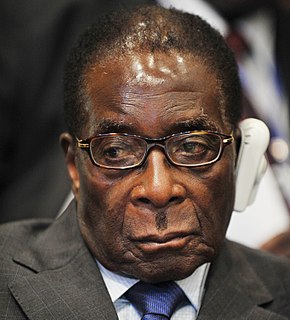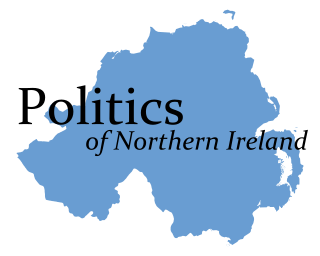 W
WThe 2008–2009 Zimbabwean political negotiations between the opposition Movement for Democratic Change, its small splinter group, the Movement for Democratic Change – Mutambara, and the ruling Zimbabwe African National Union – Patriotic Front were intended to negotiate an end to the partisan violence and human rights violations in Zimbabwe and create a framework for a power-sharing executive government between the two parties. These negotiations followed the 2008 presidential election, in which Mugabe was controversially re-elected, as well as the 2008 parliamentary election, in which the MDC won a majority in the House of Assembly.
 W
WA cross-community vote or cross-community support is a form of voting used in the Northern Ireland Assembly according to the provisions of the 1998 Good Friday Agreement. It requires the support of both main communities in Northern Ireland, in other words majority of unionists and the majority of nationalist members of the Assembly. Among other reasons, it arises when the petition of concern procedure is invoked.
 W
WThe General Framework Agreement for Peace in Bosnia and Herzegovina, also known as the Dayton Agreement or the Dayton Accords, is the peace agreement reached at Wright-Patterson Air Force Base near Dayton, Ohio, United States, on 21 November 1995, and formally signed in Paris, on 14 December 1995. These accords put an end to the three-and-a-half-year-long Bosnian War, one of the Yugoslav Wars.
 W
WThe First Czechoslovak Republic, often colloquially referred to as the First Republic, was the first Czechoslovak state that existed from 1918 to 1938, dominated by ethnic Czechs and Slovaks, the country was commonly called Czechoslovakia, a compound of Czech and Slovak; which gradually became the most widely used name for its successor states. It was composed of former territories of Austria-Hungary, inheriting different systems of administration from the formerly Austrian and Hungarian territories.
 W
WThe Good Friday Agreement (GFA), or Belfast Agreement, is a pair of agreements signed on 10 April 1998 that ended most of the violence of the Troubles, a political conflict in Northern Ireland that had ensued since the late 1960s. It was a major development in the Northern Ireland peace process of the 1990s. Northern Ireland's present devolved system of government is based on the agreement. The agreement also created a number of institutions between Northern Ireland and the Republic of Ireland, and between the Republic of Ireland and the United Kingdom.
 W
WHindu–Muslim unity is a religiopolitical concept in the Indian subcontinent which stresses members of the two largest faith groups there, Hindus and Muslims working together for the common good. The concept was championed by various person such as leaders in the Indian independence movement, such as Mahatma Gandhi and Khan Abdul Ghaffar Khan, as well as by political parties and movements, such as the Indian National Congress, Khudai Khidmatgar and All India Azad Muslim Conference. Those who opposed the partition of colonial India often adhered to the doctrine of composite nationalism.
 W
WThe concept of an Indo-Pakistani Confederation advocates for a political confederation consisting of the sovereign states of India and Pakistan as a means of ending bilateral conflicts and promoting common interests in defence, foreign affairs, and cultural and economic development. While this idea does not propose to end the sovereign existence of either nation through reunification, it is aimed to resolve the conflicts afflicting the Indian subcontinent since the partition of India in 1947.
 W
WThe Ohrid Framework Agreement was the peace deal signed by the government of the Republic of Macedonia and representatives of the Albanian minority on 13 August 2001. The agreement was signed by the country's four political parties after international mediators demanded their commitment to its ratification and implementation within a four-year period.
 W
WThe St Andrews Agreement is an agreement between the British and Irish governments and Northern Ireland's political parties in relation to the devolution of power in the region. The agreement resulted from multi-party talks held in St Andrews in Fife, Scotland, from 11 to 13 October 2006, between the two governments and all the major parties in Northern Ireland, including the two largest, the Democratic Unionist Party (DUP) and Sinn Féin. It resulted in the restoration of the Northern Ireland Assembly, the formation of a new Northern Ireland Executive and a decision by Sinn Féin to support the Police Service of Northern Ireland, courts and rule of law.
 W
WA triumvirate or a triarchy is a political institution ruled or dominated by three powerful individuals known as triumvirs. The arrangement can be formal or informal. Though the three are notionally equal, this is rarely the case in reality. The term can also be used to describe a state with three different military leaders who all claim to be the sole leader. In the context of the Soviet Union and Russia, the term troika is used for "triumvirate".
 W
WThe Yalta Conference, also known as the Crimea Conference and codenamed Argonaut, held February 4–11, 1945, was the World War II meeting of the heads of government of the United States, the United Kingdom, and the Soviet Union to discuss the postwar reorganization of Germany and Europe. The three states were represented by President Franklin D. Roosevelt, Prime Minister Winston Churchill, and Premier Joseph Stalin, respectively. The conference was held near Yalta in Crimea, Soviet Union, within the Livadia, Yusupov, and Vorontsov Palaces.